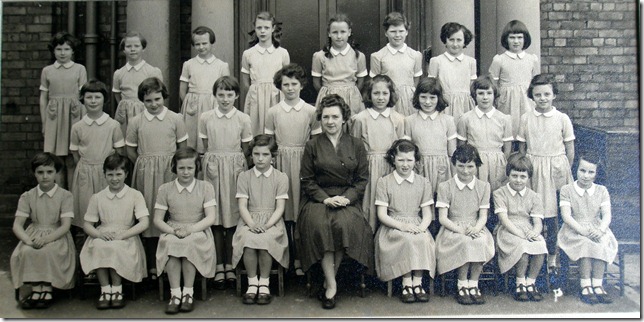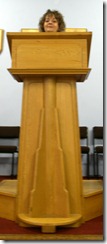If you are old enough to answer this question, tell me, what have you done with the last 40 years? If you don’t have that many years under your belt, what will you do with the next 40 years?
Following a reunion of school friends I had not seen for forty years, I am in the astounding position of being able to tell you what your very own next forty years will contain. I have extrapolated, thunk and polished up the crystal ball and at the foot of this column will reveal all you need to know. How amazing is that? No peeking!
First come back with me to May 1960, when I was only just nine. There I am in the bottom row on the extreme left, undersized, terrified and sitting exactly so, just like everyone else except those who are standing so exactly any reasonable army would have recruited them at once. Standards were high and competitive; individual thinking, if it was along intellectual lines, was not discouraged, providing you had learned your seven times table first and would demonstrate your knowledge promptly, with a raised hand, whilst sitting cross legged on the wooden floor. Creativity was proscribed; I made a man out of leaves in my autumn collage, when it was supposed to be just an arrangement but I enjoyed the papier mache ashtray made on a saucer and the puppet head papier mached round a potato with plasticene features. The teacher kept order as if we were a bunch of proto terrorists instead of the daughters of aspiring tradesmen, businessmen, the clergy and doctors. Looking at the picture now I am astounded at our unquestioning obedience – we outnumber her considerably, why did we not notice this at the time?
I wasn’t well enough to attend the first reunion last year, which was in London. When I heard that the second this year was to include a visit to the school I was torn between curiosity and trepidation. Whilst I was hopeful that adulthood and age would have cut some educational terrors down to size, I was fearful that everyone would have done better than me in the intervening 40 years. I was certain they would all be richer, thinner, taller and more successful, with fulfilling careers, toyboy husbands and dozens of beautiful children all flying high in industry and television at least. I don’t know why I thought that. Was it the very competitive nature of our education, not intended to turn out career women, for there was no careers advice of any kind; education was focussed in the 1950s on producing the kind of wives and mothers necessary to get the country back on its feet after the war.
I wavered; it’s a long drive north for something possibly awful. We were to meet for a tour of the school, a dinner and a lunch the following day. That felt like a long time to me, hours and hours. Would there be awkward silences? Would the rich, thin millionaires just walk out on the rest of us?
Having negotiated the new convoluted traffic system with time to spare I was first there, into a building that was not part of the school in our time. I didn’t recognise all the others, though I was easy to spot, still being the shortest.
Does my head look big in this? This is on the stage, which had shrunk, blessedly and so, apparently, have I, not quite as blessedly. I still loved the library, got shivers in the detention room and walked up the stairs still single file, no talking. Soon we were returned to the meeting room, sat round the table and talked.
Being the short, loud one I went first with the biographical details. One girl had risen to become a school inspector, one has travelled round the world, one eventually married the boy from another country she had met as a teenager when he answered a message in a bottle thrown into the sea. We got through halfway through the stories and decamped to meet again at a restaurant where two others joined us with more amazing tales of triumph and disaster, of lives, loves and the lost.
One thing was clear, the notions of service to others, so strongly inculcated, had resounded in many lives, as had teaching, the only job ever demonstrated.
What I had not appreciated was the complexity of the home lives of these supposedly happy middle class girls. How could I know that the doctors’ daughters had parents who were heavy drinkers? In our youth the local doctor was a one man band, assisted by his unpaid wife at all hours. The stress of the job was unimaginable and drinking socially acceptable. I do remember visiting the house of one girl whose father never really stood still, even when he was standing still but I had no idea others had difficult lives. I did well at school, possibly because it was easier than home, where for all of us, it seems, there was pressure to do well, which in the 1950s meant marrying well and learning a lot so you could be a good mother. I do not remember at any point anyone suggesting we could have a career, or a career that we would enjoy. In a single sex school boys were kept as a mystery and the attention riveted firmly to Latin irregular verbs and suchlike. Sexual ignorance was supposed to be bliss, an attitude which had not served a relative of one of our number well at all. There was so little information on this point I’m amazed no one married a horse or a roll of carpet by mistake.
The following day by the time we’d had lunch, I think everyone in the group had managed to speak individually to everyone else. We’re going to try next year to get the whole class together, except for the girl who died nine years ago and the girl who has dementia and Parkinsons. We still have not been able to contact some of the group and would love to do so; if you recognise yourself or someone else in the black and white photograph, please get in touch.
I found the reunion a very helpful experience. It’s informative to look at where you have been, before you move forward into your future. The girls were all kind to each other and to me; their work, lives and duties as wives and mothers had served them well. Each girl’s experience of the trials and tribulations, shared and singly that we had faced, had formed the kind of individual you could depend upon and that desirable product, the rounded human being. No one in the group appears to be selfish, naive, or stupid; if there’s anyone loud and short it’s still me. They are survivors of their own lives, they have triumphed over their difficulties and face the unknown future with courage and hope.
What do you think the next forty years will hold for you? Based on the experiences of my school friends, I can make a prediction. If I were to give you some advice it would be to live each day to the utmost; as our missing friends bear witness, no one knows how long they can stay at the party. Seize the hour and the day and live fully in each second for your unique life is yours alone; there is and will be nothing uniform about it.
Which leads me to the prediction: for you, uniquely, specially and unlike any other, in the next forty years there will be the most massive and extraordinary — surprise. Life is the schoolroom; I promise it will be educational!
……………………………………………………………we all did.
JaneLaverick.com – always learning.



